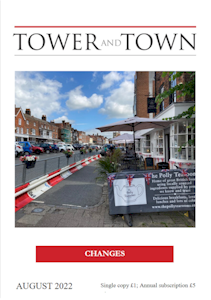

Tower and Town, August 2022 (view the full edition) (view the full edition)Changes In Policing
The officers living in the villages were part of two sections that covered the area in 8 hour shifts over 24 hours. The Home Office at the time stipulated that a section should consist of 1 Sergeant and 6.5 Constables! All that changed when it was agreed that officers could buy their own property, which meant that some officers were living outside the area. Eventually all the properties were sold and the old Police Station was demolished and replaced by a smaller building. A big problem in Marlborough when I first arrived was the traffic. As the A4 was a major holiday route, traffic on Saturdays in the summer was horrific and point duty was required at the London Road/Salisbury Road junction to keep the traffic flowing as much as possible. It was not unusual for traffic to be queuing back as far as the Stitchcombe turning. The change came when the M4 opened. The Police were also responsible for prosecutions at the Magistrates Court which was held every Thursday at the Town Hall. This had a very useful advantage in that if there had been a major incident over a weekend the people involved could be brought to Court the following Thursday, which told the local population that the matter had been dealt with swiftly. The Crown Prosecution Service was created to relieve the Police of this duty. The decisions to prosecute and the actual prosecutions were then made by lawyers based at Chippenham. When I started at Marlborough the public office was always manned by a Police Officer, but they were gradually replaced by trained civilian staff. Throughout my time at Marlborough morale was very high and every one worked hard to provide a good service to the population of this lovely area. David Davidge |